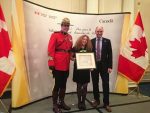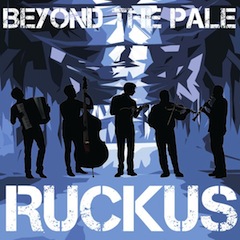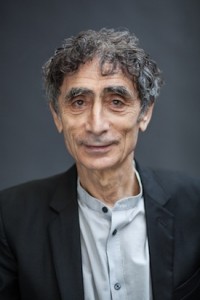Left to right, panelists Gabor Maté, Michael Barkusky and Yonatan Shapira. (photo by Zach Sagorin)
Independent Jewish Voices-Vancouver hosted A Conversation About BDS (boycott, divestment and sanction) on Nov. 8. IJV’s Martha Roth, moderator of the event, told the Jewish Independent, “The Israeli government propaganda has been so strongly anti-BDS and people are terrified of it.… We wanted to make a safe space for discussion.”
In order of presentation, the four panelists were columnist Dr. Mira Sucharov, an associate professor of political science at Carleton University, who joined the discussion via FaceTime; Yonatan Shapira, a former Israeli rescue helicopter pilot who has become a Palestinian solidarity activist; Michael Barkusky of the Pacific Institute for Ecological Economics, who was born in South Africa and was an anti-apartheid activist during university; and author and speaker Dr. Gabor Maté, a former Zionist youth leader.
The BDS movement (bdsmovement.net) calls for Israel to end “its occupation and colonization of all Arab lands occupied in June 1967 and dismantl[e] the [security] wall”; recognize “the fundamental rights of the Arab-Palestinian citizens of Israel to full equality”; and support “the rights of Palestinian refugees to return to their homes and properties as stipulated in UN Resolution 194.”
Shapira told the crowd: “The BDS movement is a human rights-based initiative calling for equality … end of occupation, end of apartheid situation and to promote the right of return. It is not saying that Israel is the most devilish thing in the world. It doesn’t say what is happening in Syria is better.… It is just a nonviolent practical tool to change the power balance in the situation.”
Maté based his view on the actions carried out in 1947/48, which, he said, “involved massacres … expulsions of large numbers of people from their homeland … demolition of hundreds of villages, the bulldozing of gravestones. Going to Palestine-Israel today is like going to Europe today and looking for a trace of Jewish life.”
He continued, “On top of that now, you have this occupation, this totally illegal occupation… Even if you assume Israel has a right to conquer those lands in 1967…. They never had the right under international law to enter these demographic changes, that’s against the law. To build businesses and economy, that’s against the law. It’s not even controversial.”
The only panelist against BDS, Sucharov said, “I have spoken out, mostly through writing, against BDS … for the reason, I think the end-game is confused.”
While portions of Sucharov’s arguments were inaudible due to technical difficulties, she did make her main points heard. She referenced Prof. Rex Brynen of McGill University, in saying, about the right of return, “repatriation in that case would refer to Palestinians who are still stateless being able and encouraged to return to a Palestinian state, but, in order for that to happen, a Palestinian state needs to come about. So the question is, How to change this tired and bloody status quo that we see right now in order to see a Palestinian state?”
She added, “Instead of boycott, I call for wrestling, grappling and engagement. Instead of shunning, I call for dialogue. Both sides want, if you want to use the binary construct of sides, to play their own game of boycott and shunning and narrowing of the discourse…. The most egregious expression of that has been the academic boycott that has been used to cut off the kind of debate and dialogue we are having today.”
She said, for example, that philosopher and law professor Moshe Halbertal was blocked from speaking at the University of Minnesota on Nov. 3 for 30 minutes by BDS supporters, and that she has witnessed the same shunning of dialogue “within the mainstream Jewish community.”
Shapira later responded to the notion of academic boycott: “Only if the professor is connected and representing an official institution in Israel, then it’s a target for the boycott.… All Israeli universities are connected to the occupation … therefore, if someone is representing them, it’s a target for the boycott.”
About the debate over SodaStream, which was located in the West Bank and employed 500 Palestinians, Sucharov said, “One could certainly view that as a way of propping up the settler project, and we know the settlements are illegal under international law. What was key and what the boycott movement got wrong [is], the owner had stated that if and when there would be a Palestinian state, tomorrow he would seek to keep the plant there and simply pay taxes to the new Palestinian state.” She later added, “This is an example of direct investment that will be essential to help the Palestinian economy in its sovereign incarnation.”
Maté countered, “When you are taking people’s lands, when you build a wall that separates them from their fields, when you make life impossible, when you destroy their economy, when you practise environmental degradation on their whole country, guess what, they are going to be desperate for jobs.” He said SodaStream’s “giving 500 jobs to the Palestinians” was “not an argument against boycott, not an argument against economic pressure.”
Sucharov argued that BDS works against a two-state solution: “Scores of Palestinian, Israeli and joint Palestinian-Israeli NGOs are doing work in the West Bank and Israel. There are many groups seeking to engage the situation. With boycott, one has cut off one’s ability to connect with those activists who seek to engage, to visit Israel, visit the West Bank and try to change status quo.”
Shapira said, “Wake up from this old dream of a two-state solution…. We are intertwined together with the Palestinians whether we want it or not. We have to move on from a conflict between two sides … an occupier force and an occupied, an oppressor and oppressed, a colonizer and native. This is the context and we have to change the mindset.
“It is not, let’s go for a dialogue meeting with Israeli and Palestinian kids. I am not saying I am against dialogue,” but dialogue “will not be what brings the solution … the solution will come when we change the power dynamic.” He said, looking at the audience, that they “were probably a part of struggle to end apartheid…. If you supported boycott back then, you should support boycott now.”
About the use of BDS to end apartheid, Barkusky said, “About 25% of South African civil society wanted the end of apartheid … and my worry is that I don’t think that 25% of Jewish Israelis today are ready for a two-state solution, or certainly not a one-state solution.” Barkusky warned that “any BDS strategy, to be effective, needs to avoid sweeping the centrist majority in Israel into the hands of the right-wing.”
Barkusky was “ambiguous” about BDS. “There are certain, obviously attractive features of BDS. It is accessible when other strategies seem futile and it appears to be nonviolent,” he said. However, he added, BDS “is a collective punishment strategy,” akin to an aerial bombing: “hard to target and collateral damage.” BDS can be “damaging and [destroy] people’s livelihoods,” he said, and it “is not exactly nonviolent: it can crush peoples’ hopes, it can lead to suicide, it can lead to domestic violence.”
Maté said it is a “pipedream to shift Israeli policy by being really nice about it.” When it came to boycott specificities, he said, “If you are only willing to boycott stuff from the occupied territories, boycott stuff from the occupied territories. If you want to boycott everything, boycott everything…. If you want to boycott academia as well, go ahead, I don’t care. Because it doesn’t matter what small, little arguments or details we want to engage in because the overall reality for everybody who has been there … is so horrible and is getting daily more horrible that the insanity is out of control now and only external pressure will do anything about it.”
Shapira said, “You cannot live in peace and security if you are superior over other people in that country. You cannot have the oxymoron of a Jewish democracy. We have to give up this idea, it is not possible.”
Around 80 people attended the event, which was held at the Peretz Centre for Secular Jewish Culture, including professor Rabbi Dr. Laura Duhan Kaplan, interim director of Iona Pacific Inter-Religious Centre at the Vancouver School of Theology. She told the Independent, “There was a significant amount of agreement in the audience and so the questions were not as provocative as they would have been if … most people weren’t left-leaning.”
Zach Sagorin is a Vancouver freelance writer.





